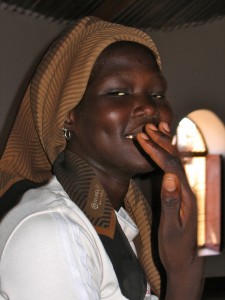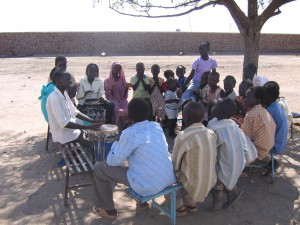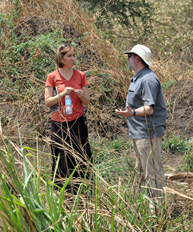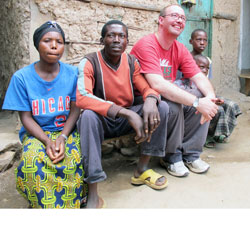Matthew 17:1-9
Icon of the Transfiguration by Andrei Rublev (1405), now located in the Moscow Annunciation Cathedral
When Peter and James and John went up the mountain with Jesus that long-ago-but-memorable day, they literally had no idea what was about to happen.
They thought they were going to pray. After all, that’s what Jesus regularly did, and so for them, this was just another day following their teacher and Lord.
But, really: They had no idea what was in store.
Up they go, and boom! Jesus is transfigured right in front of them! His face shines like the sun, his clothes are dazzling white, and right there stand Moses and Elijah, chatting with Jesus!
You know that was a surprise. You know this was not on their agenda for the day. (Take a walk with Jesus? Check. Climb the mountain? Check. See Jesus transfigured? Huh?)
But the surprises didn’t stop there.
Because just as Peter in his great excitement was babbling away – “Lord, this is great! Let me make three little houses for you …” (perhaps to fix Jesus, Moses and Elijah in that moment?), just as he was reacting as only Peter could react, God spoke.
Now remember:
In the Hebrew Scriptures, God speaks to people all the time.
But in the New Testament, in the Gospels, God only speaks a few times (one of them being up on that mountain, when God interrupts Peter to proclaim Jesus as God’s son, the beloved, with whom God is most pleased).
In the Hebrew Scriptures, God commands all the time (often on a mountain – remember Moses and the 10 Commandments?)
But in the New Testament, God only commands once.[1]
Only one time – right here, right on the mountaintop – does God issue a commandment:
Akouete![2] Listen to him!
Like the commandments of old, this is not a suggestion. This is not God saying, “Hey, you know, when you’ve got a moment, I’d really like it if you’d pay attention … but only if you want to.”
This is not God throwing a hissy fit like a little kid who’s trying to win an argument on the playground and whining: Listen to me!
This is God in all of God’s glory – remember Jesus’ shining face and dazzling clothes? Remember Moses? Remember Elijah? This is God on high booming out (because you know God wasn’t namby-pamby here):
Akouete! Listen to him!
Not “Listen to me,” but “Listen to him.”
If ever you have wondered whether Jesus was the real thing … if ever you wondered – and many have – whether perhaps we got it all wrong, that perhaps Jesus is more of a prophet and less the Son of God … now’s the time to pay attention.
Because right now, in this moment, on this mountaintop, God is making it crystal clear:
This is my son.
He is my beloved.
And you had better for darned tootin’ listen to him!
• • •
For the last eight years, the non-profit organization StoryCorps has been collecting the stories of Americans “of all backgrounds and beliefs.”[3] The stories are great; I listen to them on NPR’s Morning Edition every Friday. But to me, what’s more important than the stories themselves is the idea behind StoryCorps:
Listening, StoryCorps proclaims, is an act of love.
Listening … is … an act … of love.
That’s important for us to remember, because, you see, we are created in love. Remember, we are not necessary to God. God is necessary to us, but we are not necessary to God, because God was before we were, and God will be after we are, so we cannot possibly be necessary to God. So God must have wanted us. God must have desired us into being. God must have loved us into being. So we were created in love.
And this command, Akouete? Listen to him?
This command is our blueprint for how we are to live in the image of God in which we are created. It is our blueprint for how we are to love.
If we want to be faithful servants of our Lord and Savior Jesus Christ, if we really want to live our lives as God would have us live them, we … need … to … listen … to … Jesus.
Listening is how we love.
When we listen, we are loving God.
When we listen, we are loving our neighbors as ourselves.
When we listen, we are loving our neighbors as Jesus loves us.
The great 20th-century theologian Paul Tillich once proclaimed that “The first duty of love is to listen.”[4] That duty comes from God’s direct command, not through prophets and apostles, but from God on high to the actual witnesses – Peter and James and John, who heard God speak to them, who heard God say to them, Akouete!
And now, today, on this last Sunday of Epiphany, with Lent beginning in just three days, God is speaking to us.
God is commanding us: Akouete! Listen to him!
And if we are wise, if we are caring, if we are faithful, we will listen.
For when we listen and are wise, we can see what is happening around us, and figure out what God wants us to do about it.
When we listen and are caring, we can build the relationships God is calling us to build, with God’s beloved children.
When we listen and are faithful, then … and only then … can we follow in Jesus’ footsteps.
What it all boils down to is this:
Listening is an act of love … so listen up!
We already know what Jesus wants us to do … because he’s already told us. But sometimes, we need to listen again, because sometimes, once is not enough.
So what is it that Jesus wants us to do?
Feed the hungry. Give water to the thirsty. Make the blind see … the deaf hear … the mute speak … the lame leap for joy.
When we listen to Jesus, what do we hear him saying to us?
Live lives of love.
Live lives of wild … radical … inexplicable … never-ending … love.
This is our mission in life, my friends. This is why God created us: to go into the world and love … just as God loves us … wildly, radically, inexplicably, eternally.
But … we say … but … this is hard! How are we supposed to love like this? We don’t know what to do? (And yes, all of us say this, all the time … because loving like this really is hard and we really do need a set of directions, we really want to see a blueprint before we begin.)
The good news is, God already has told us what to do and how we are to do it. God has already given us the directions and shown us the blueprint.
Step one: We listen.
As a missionary – I served for five years overseas on your behalf (all Appointed Missionaries represent the entire Episcopal Church, not just our own dioceses, which means that I was your missionary) – I can tell you that listening is key to serving.
Wherever I have served, particularly as a missionary – in Kenya, Sudan, Haiti, Honduras, Appalachia or Pine Ridge, in homeless shelters and food pantries, with poor, inner city residents and rich suburbanites – I have learned that when I listen to the people of God, I hear the voice of God. I hear Jesus’ commandment to love.
And this call I hear?
It’s not just mine. It’s a call to all of us – because all of us are God’s missionaries in God’s very good creation.
How many of you are Episcopalians? Did you know that the legal name of our Church is the Domestic and Foreign Missionary Society of The Episcopal Church of the United States of America? That we made that change in 1821? And that we made that change in our name because we determined then that we were going to a Church that went out into the world and preached the Gospel, and if necessary (as St. Francis is reputed to have said) using words? Which means that all of us here are missionaries.
So all of us are sent forth into God’s world, not to speak, not to tell others what to do, not to be so all-fired certain that we are right and everyone else is … well, they’re just delusional!
No!
God tells us: Akouete! Listen to him!
Listen to Jesus as he tells us: Love your enemy. Tend the sick. Visit the prisoners. Bring joy to the sorrowful. Give courage to the fearful. Feed the hungry and give water to the thirsty and sight to the blind and hearing to the deaf and voice to the mute and dancing to the lame!
Jesus has told us … in no uncertain terms … what he wants us to do. Jesus wants us to love!
And the first act, the first duty of love is to listen.
Not just to the people we love, not just to the people we know. No! We need to listen to each and every one of God’s beloved children, because God doesn’t discriminate. In God’s very good creation, there are no us’s and them’s. In God’s very good creation, no one gets voted off the island!
Only when we take the time to listen to God’s beloved children, only then do we hear their joys and sorrows, their dreams and disappointments, and their hopes and their desperate desire to know that they are loved, that they are the beloved.
Make no mistake, my friends:
God is speaking to us. God is on this mountaintop with us, right here, right now, and God is telling us – in every way possible – that our call is to love.
So listen up!
Amen.
A sermon preached on the Last Sunday of Epiphany, 6 March 2010, Year A, at St. Stephen’s, New Hartford, NY, and St. John’s, Whitesboro, NY.
[1] Brian P. Stoffregen Exegetical Notes at Crossmarks Christian Resources, Matthew 17:1-9, Transfiguration of our Lord, Last Sunday after the Epiphany, Year A, http://www.crossmarks.com/brian/matt17x1.htm.
[2] Ibid.
[4] Paul Tillich, German-born American Protestant theologian (1886-1965), in a story about Tillich, as quoted in O Magazine, February 2004.


















